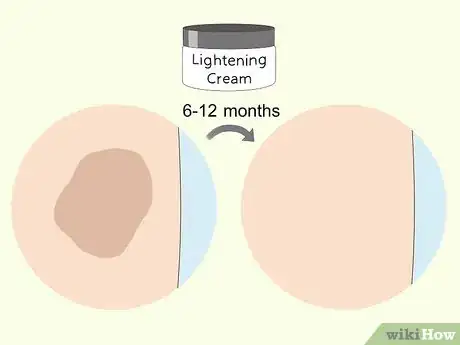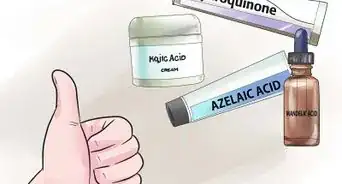This article was co-authored by wikiHow staff writer, Hannah Madden. Hannah Madden is a writer, editor, and artist currently living in Portland, Oregon. In 2018, she graduated from Portland State University with a B.S. in Environmental Studies. Hannah enjoys writing articles about conservation, sustainability, and eco-friendly products. When she isn’t writing, you can find Hannah working on hand embroidery projects and listening to music.
There are 8 references cited in this article, which can be found at the bottom of the page.
wikiHow marks an article as reader-approved once it receives enough positive feedback. This article has 41 testimonials from our readers, earning it our reader-approved status.
This article has been viewed 4,239,469 times.
Learn more...
If you’re looking for a way to lighten your skin naturally, you’ve probably stumbled upon the lemon juice lightening method. While lemons do contain some key vitamins, putting lemon juice on your skin isn’t the best (or safest) way to lighten dark marks. We’ve answered some of your common questions about skin lightening so you can keep your skin healthy while doing it.
Steps
What are some other things you can do with lemon juice?
-
1You can treat oily skin with lemon juice and oatmeal. If you deal with oily skin, grind 2 tbsp (28 g) of old-fashioned oats into a fine powder. Mix the oat flour with 1 US tbsp (15 mL) of fresh lemon juice and 2 teaspoons (9.9 mL) of honey. Dab it on your skin with clean fingers, then let it sit for 15 minutes. Wipe the mask off with a warm, wet washcloth when you’re done.[4]
-
2You can treat dry skin with honey, avocado, and oatmeal. If you’d like to hydrate your skin while fading dark marks, mix together 1/4 of a mashed avocado, 1 tsp (4.9 mL) of fresh lemon juice, 1⁄2 US tbsp (7.4 mL) of olive oil, and 1 US tbsp (15 mL) of honey. Apply the mask to clean skin and leave it on for about 20 minutes, then rinse it off with warm water.[5]
How do you lighten your skin naturally?
-
1Try a skin lightening product. Skin lightening products infiltrate your skin and reduce the melanin that creates dark spots. Look for a product with 2% hydroquinone, azelaic acid, glycolic acid, kojic acid, retinoid, or vitamin C to make sure it’s effective. If you aren’t sure which product to buy, get a recommendation from a licensed dermatologist.[8]
-
2Use sunscreen every day. Sunscreen protects your skin from UV rays and stops the dark patches on your skin from getting worse. Make it a part of your routine to put on SPF 30 or higher every day to avoid dark spots and wrinkles.[9]
Community Q&A
-
QuestionI've just purchased a lemon oil with coconut oil carrier. Do I need to be worried about going out under the sun after applying it?
 wikiHow Staff EditorThis answer was written by one of our trained team of researchers who validated it for accuracy and comprehensiveness.
wikiHow Staff EditorThis answer was written by one of our trained team of researchers who validated it for accuracy and comprehensiveness.
Staff Answer wikiHow Staff EditorStaff AnswerLemon oils are usually filtered, meaning they take the dangerous chemicals out. You should be fine to go out into the sun after applying the product. If you notice any redness or irritation, head back inside right away and wash the product off.
wikiHow Staff EditorStaff AnswerLemon oils are usually filtered, meaning they take the dangerous chemicals out. You should be fine to go out into the sun after applying the product. If you notice any redness or irritation, head back inside right away and wash the product off. -
QuestionCan you keep lemon juice on your face overnight?
 wikiHow Staff EditorThis answer was written by one of our trained team of researchers who validated it for accuracy and comprehensiveness.
wikiHow Staff EditorThis answer was written by one of our trained team of researchers who validated it for accuracy and comprehensiveness.
Staff Answer wikiHow Staff EditorStaff AnswerWhile this is something you can do (as it's generally not going to cause harm other than potentially drying the skin), it has no benefits, so it's really not a worthwhile activity. It can leave your skin feeling sticky, and the juice will end up on your pillowcase and sheets. Since it doesn't have a benefit, and can increase skin dryness, this seems like a lot of effort (putting it on and cleaning the bed linen) for no real returns. If you do leave it on, be sure it is thoroughly washed off before you head outside, to lessen any risk of reaction with sunlight on your skin.
wikiHow Staff EditorStaff AnswerWhile this is something you can do (as it's generally not going to cause harm other than potentially drying the skin), it has no benefits, so it's really not a worthwhile activity. It can leave your skin feeling sticky, and the juice will end up on your pillowcase and sheets. Since it doesn't have a benefit, and can increase skin dryness, this seems like a lot of effort (putting it on and cleaning the bed linen) for no real returns. If you do leave it on, be sure it is thoroughly washed off before you head outside, to lessen any risk of reaction with sunlight on your skin. -
QuestionI'm black. If I do this process, can I become little white?
 Community AnswerThe lightening effect of natural substances like lemon is very mild. It will lighten your skin a little bit, but you will still be black. Drastically altering your skin tone requires harsh chemicals. And it is generally not worth it. It's best to try to accept yourself as you are and embrace your own natural beauty.
Community AnswerThe lightening effect of natural substances like lemon is very mild. It will lighten your skin a little bit, but you will still be black. Drastically altering your skin tone requires harsh chemicals. And it is generally not worth it. It's best to try to accept yourself as you are and embrace your own natural beauty.
Warnings
- Going out in the sun with lemon juice on your skin can cause severe burns.[12]⧼thumbs_response⧽
References
- ↑ https://www.aarp.org/entertainment/style-trends/info-2018/natural-remedies-age-spots-fd.html
- ↑ https://www.tandfonline.com/doi/full/10.3402/jchimp.v4.25090
- ↑ https://www.tandfonline.com/doi/full/10.3402/jchimp.v4.25090
- ↑ https://www.epicurious.com/archive/healthy/news/homemade-beauty-products-lemon-oatmeal-face-mask
- ↑ https://www.bostonmagazine.com/health/2018/08/30/natural-face-masks-recipes/
- ↑ https://cosmeticsinfo.org/ingredient/citric-acid
- ↑ https://cosmeticsinfo.org/ingredient/citric-acid
- ↑ https://www.aad.org/public/everyday-care/skin-care-secrets/routine/fade-dark-spots
- ↑ https://www.aad.org/public/everyday-care/skin-care-secrets/routine/fade-dark-spots
About This Article
To lighten your body with lemon juice, cut a lemon in half and rub the rind all over your skin. Leave the juice on for a few minutes and then rinse it off in the shower. If you want to lighten your face with lemon juice, start by cutting a lemon in half and squeezing the juice onto a cotton ball. Then, carefully rub the cotton ball over your face so you don't get it in your eyes. Leave the lemon juice on for a few minutes and then rinse your face off. Repeat on your body and face 3-4 times a week until you've achieved your desired results! Keep reading the article if you want to learn more, such as how to make a lemon wash or cream!








































































